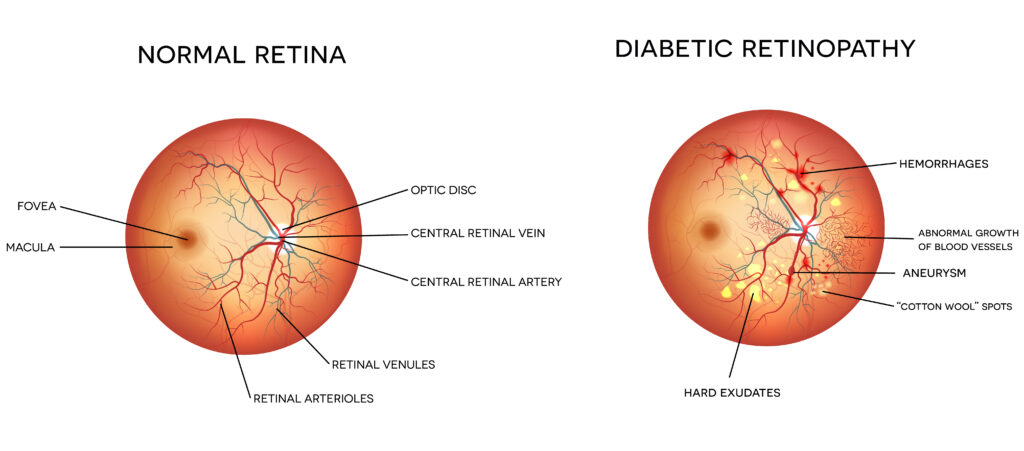Diabetic Retinopathy
Diabetic Retinopathy
Diabetic retinopathy is an eye condition that affects the retina at the back of the eye in those who have diabetes. At Retina Consultants of Orlando, our retina specialists have the experience and training to detect diabetic retinopathy early and help prevent vision loss.

What is Diabetic Retinopathy?
Diabetic retinopathy is a vision-threatening eye condition that occurs in those with diabetes when blood sugar becomes uncontrolled. Diabetic retinopathy affects the retina, which is a layer of photosensitive cells located at the back of the eye.
In those who have diabetes, elevated blood sugar levels can damage the retina’s blood vessels. When the blood vessels become damaged, they can expand and leak.
Alternatively, they might shut, preventing blood flow. In some cases, abnormally new blood vessels can form in the retina.
These changes in the retina can cause extensive vision loss. To avoid vision loss associated with diabetic retinopathy, it’s crucial to undergo a thorough dilated eye exam at least once a year if you have diabetes.

What are the Symptoms of Diabetic Retinopathy?
The symptoms of diabetic retinopathy can vary depending on the stage and severity of the condition. Some common symptoms include:
It is important to note that in the early stages of diabetic retinopathy, there may be no symptoms at all, which is why regular eye exams are crucial for people with diabetes. If you have diabetes, it is important to control your blood sugar levels and get regular eye exams to prevent diabetic retinopathy and detect it early if it does occur.
Who is At Risk For Diabetic Retinopathy?
Although anyone with diabetes can develop diabetic retinopathy, certain risk factors may increase your likelihood of developing diabetic retinopathy. Here are some other factors that increase the risk of diabetic retinopathy:
Type of Diabetes
People with type 1 diabetes or type 2 diabetes are both at risk for diabetic retinopathy.
Duration of Diabetes
The longer you have diabetes, the higher the risk of developing diabetic retinopathy.
Poor Blood Sugar Control
High blood sugar levels can damage blood vessels in the retina and increase the risk of developing diabetic retinopathy.
High Blood Pressure
High blood pressure can increase the risk of developing diabetic retinopathy.
High Cholesterol Levels
High cholesterol levels can contribute to the development of diabetic retinopathy.
Pregnancy
Pregnant women with diabetes have an increased risk of developing diabetic retinopathy.
Smoking
Smoking can increase the risk of developing diabetic retinopathy and can also make it worse.
Family History
A family history of diabetic retinopathy can increase the risk of developing the condition.
How is Diabetic Retinopathy Treated?
The treatment for diabetic retinopathy depends on the severity of the condition. At Retina Consultants of Orlando, our retina specialists utilize some of the most advanced treatment methods available for diabetic retinopathy to help control the condition and prevent vision loss.
Blood Sugar Control
The first step in managing diabetic retinopathy is to control blood sugar levels through lifestyle changes such as a healthy diet and exercise or medication.
Laser Treatment
Laser treatment is often used to treat diabetic retinopathy. This procedure aims to seal off leaking blood vessels and shrink abnormal ones.
Laser treatment can slow or stop the progression of the disease and preserve vision.
Vitrectomy Surgery
Vitrectomy surgery is used to treat advanced diabetic retinopathy where there is significant bleeding in the eye, or the retina has detached. In this procedure, the surgeon removes the vitreous gel in the back of the eye and any scar tissue that may be pulling on the retina.
Anti-VEGF Injections
Anti-VEGF injections are used to treat diabetic macular edema, which is the swelling of the macula caused by fluid leaking from blood vessels. The injections reduce the growth of new blood vessels and help to prevent further leakage.
Corticosteroids
Corticosteroids are used to treat diabetic macular edema when anti-VEGF injections are not effective. The corticosteroids reduce inflammation and swelling in the macula.
Can Diabetic Retinopathy Be Prevented?
While it may not be possible to completely prevent diabetic retinopathy, there are several steps that people with diabetes can take to lower their risk of developing the condition or reduce its severity. These include:
Control Your Blood Sugar Levels
Keeping your blood sugar levels under control is one of the most important steps you can take to prevent diabetic retinopathy. This involves following your doctor’s recommended treatment plan, including taking medications and making lifestyle changes as needed.
Manage Your Blood Pressure And Cholesterol Levels
High blood pressure and high cholesterol can also contribute to the development and progression of diabetic retinopathy. Working with your primary care doctor to manage these conditions may help reduce your chances of developing diabetic retinopathy.
Stop Smoking
Smoking can increase your risk of developing diabetic retinopathy and other eye conditions. If you smoke, talk to your doctor about ways to quit.
Get Regular Eye Exams
Early detection and treatment of diabetic retinopathy can help prevent or slow its progression. Be sure to have your eyes examined regularly by an eye doctor who is experienced in managing diabetic eye disease.
Exercise Regularly
Regular physical activity can help control blood sugar levels and improve overall health, which may help lower your risk of developing diabetic retinopathy.
By following these steps and working closely with your healthcare team, you can help reduce your risk of developing diabetic retinopathy or prevent it from progressing if you already have it.
Are you experiencing vision changes or other symptoms of diabetic retinopathy? Schedule an appointment at Retina Consultants of Orlando in Orlando, FL, today!
